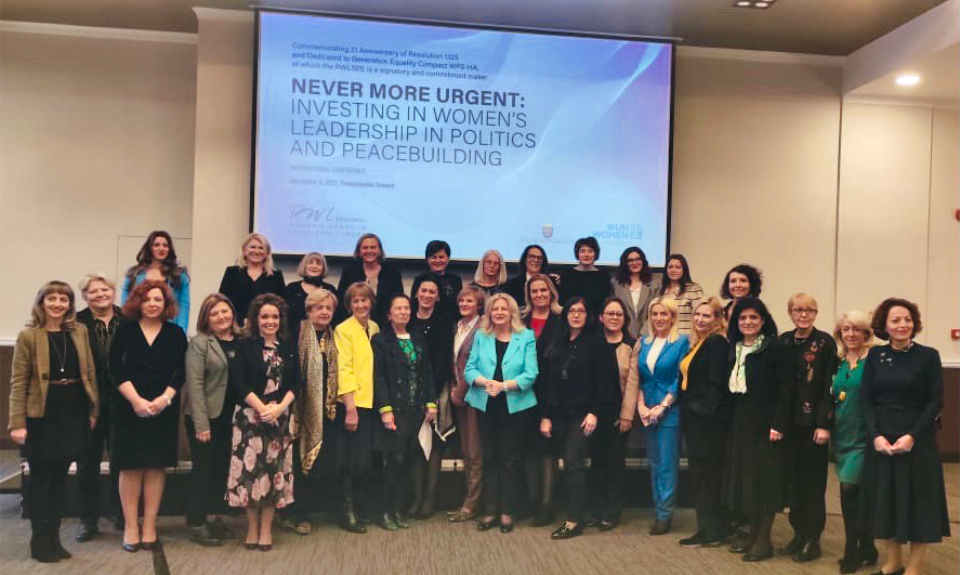Press release: International conference focuses on ensuring women's protection and protagonism in politics and peacebuilding
Date:

Thessaloniki, 8 December –The International Conference “NEVER MORE URGENT: Investing in Women’s Leadership in Politics and Peacebuilding,” organized by the Regional Women’s Lobby in Southeast Europe (RWLSEE) and UN Women, with the support of the Government of Sweden, took place on 8 December in Thessaloniki. The conference marks the 21st anniversary of United Nations resolution 1325 and is dedicated to promoting the Generation Equality Compact on Women, Peace and Security and Humanitarian Affairs (WPS-HA).
The conference provides a platform for discussion among prominent participants from the Western Balkans, international experts and representatives of UN Women Europe and Central Asia and the Government of Sweden on ways to achieve the full and meaningful participation of women in politics, peacebuilding and formal peace processes to advance democratic governance and sustainable development in the region and beyond.
It also contributes to the WPS-HA Compact, which was launched at this year’s Generation Equality Forum and intends to reshape peace and security and humanitarian action processes to systematically include women and girls in decisions that impact their lives. The Compact will provide a road map to ensure that women and girls globally are protagonists, and are protected, in line with resolution 1325.
Concerns over fragile peace and the pandemic’s negative effects on women’s participation in peace and security processes will be addressed in relation to the women, peace and security agenda, given their interplay and the necessity of shifting the paradigm of peace-making and peacebuilding to include women. The Conference will look at the strategic conditions for gender-inclusive peace-making and gender equality at peace tables. It aims to raise awareness internationally and nationally of the urgency to invest in the empowerment and leadership of women in politics and decision-making, as well as in formal peace processes, to help build a more just, peaceful and stable future in the Western Balkans and beyond.
The Conference opened with inspiring speeches by Edita Tahiri, Former Deputy Prime Minister of Kosovo[1] and Chair of RWLSEE; Alia-El Yassir, UN Women Regional Director for Europe and Central Asia; Karin Hernmarck, Ambassador of Sweden in Kosovo; and Ulrika Richardson, UN Development Coordinator in Kosovo.
In her opening remarks, Tahiri expressed happiness that participants were able to meet in-person again and congratulated all RWLSEE members and the team for 15 years of successful operations. She further emphasized that the strategic partnership of RWLSEE with UN Women and Government of Sweden have made it possible to come this far, in common efforts to shorten the road towards gender equality and shape a gender-inclusive future.
“The time has come for gender power-sharing, and we will persist in our joint struggle until women are equal at the decision-making tables. Now it is clear and widely recognized that women’s power is a strategic asset that cannot be ignored anymore. We should do everything needed for 2030 to make real our ideals of equality, inclusivity and sustainability. If we wait another century for this to happen, it means we, as women, have failed. Therefore, lets do our best for our dream to come true,” said Tahiri.
El-Yassir recalled the importance of UNSCR 1325, a landmark resolution that links gender equality and the maintenance of international peace and security and was the first to recognize women’s participation as key to resolving conflict and securing peace. She said women’s rights organizations, such as the Regional Women’s Lobby, are the true guardians of the Women, Peace and Security agenda and key to its operationalization. “The evidence is clear: having women at the peace table generates greater buy-in, strengthens accountability for implementation and also makes peace more durable because, with their inputs, agreements go beyond the realm of power to the realities of people.”
Ambassador Hernmarck reminded participants of the three essential R’s for women: rights, resources and representation. She said although some women have rights and resources they lack representation due to male decisions and ideologies, which allow only a limited number of women around the negotiating table. She also emphasized that women’s increased representation can only be achieved when women convince men to give up their seats and leave them to women.
Richardson said RWLSEE is an excellent example of regional cooperation among women working in a post-conflict environment to building peace, reconciliation and gender equality. She closed her remarks by adding that the UN stands ready and will continue to support RWLSEE in the future.
The Conference proceeded with panel discussions on “Gender-inclusive peace processes: Why is it crucial for women to be at the table?” with prominent international speakers including: Blerta Cela, Deputy Regional Director for UN Women Europe and Central Asia; Luz Helena Sarmiento, Negotiator of the Colombian Peace Agreement; Shadia Marhaban, Negotiator of the Acheh Peace Agreement; Vesna Ozbolt Skare, Chief Negotiator of the Erdut Agreement in Croatia; Mavic Belezza, Executive Director of the Global Network of Women Peacebuilders; Christine Bell, Professor of Constitutional Law and expert on gender-responsive peace agreements; Jenifer Bradshaw, International Expert on the WPS agenda and women in peace processes; Flora Macula, International Gender Expert and UN Women Head in Cox’s Bazar; and Edita Tahiri, Negotiator of the Rambouillet Peace Agreement and Chief Negotiator at the Brussels Dialogue.
The International Conference brings together women leaders in politics, civil society, parliaments, government, peace negotiations, as well as gender equality experts, women from media and the RWLSEE Steering Committee and members from the Western Balkans (Albania, Bosnia and Herzegovina, Croatia, Kosovo, Montenegro, North Macedonia and Serbia) as well as representatives from UN Women, Sweden’s Ministry of Foreign Affairs, the Embassy of Sweden in Kosovo and UN agencies.
For further information, please contact Diana Çekaj-Berisha, at: [ Click to reveal ]
[1] All references to Kosovo should be understood to be in the context of United Nations Security Council resolution 1244 (1999).